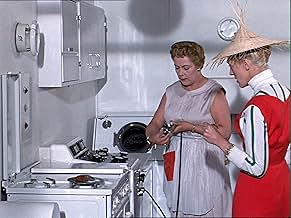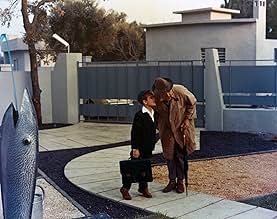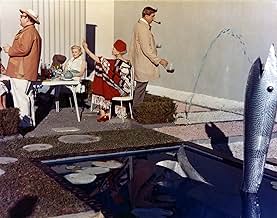IMDb-BEWERTUNG
7,6/10
25.487
IHRE BEWERTUNG
Monsieur Hulot besucht die technikversessene Welt seiner Schwester, ihres Mannes und deren Sohn, kann sich aber nicht so recht mit der Umgebung anfreunden.Monsieur Hulot besucht die technikversessene Welt seiner Schwester, ihres Mannes und deren Sohn, kann sich aber nicht so recht mit der Umgebung anfreunden.Monsieur Hulot besucht die technikversessene Welt seiner Schwester, ihres Mannes und deren Sohn, kann sich aber nicht so recht mit der Umgebung anfreunden.
- Regie
- Drehbuch
- Hauptbesetzung
- 1 Oscar gewonnen
- 7 Gewinne & 4 Nominierungen insgesamt
Jacques Tati
- Monsieur Hulot
- (Nicht genannt)
Lucien Frégis
- Monsieur Pichard
- (as Lucien Fregis)
Jean-François Martial
- Monsieur Walter
- (as J.F. Martial)
Alain Bécourt
- Gérard Arpel
- (as Alain Becourt)
Régis Fontenay
- Braces Dealer
- (as Regis Fontenay)
Daki
- Daki, the Arpels' Dachshund
- (Nicht genannt)
Dominique Derly
- La secrétaire de Monsieur Arpel
- (Nicht genannt)
- …
André Dino
- Le balayeur municipal
- (Nicht genannt)
- …
Empfohlene Bewertungen
Jacques was making a movie to WATCH for future generations to see how the simple social life in the small country towns were going to be killed off with modernism and technology. In his world, safety, community, young/old mixed socialized, street sweepers socialized with Gov't officials... modernism: Isolating, cold, ignorant. Material goods cannot replace a good doughnut and horseplay outdoors. A Vingnette of how the world was changing at that time to where we are today. The music plays in the small quaint town. Where happiness and familiarity go hand in hand. As we see he can survive in that world fine. Modernism is replacing and displacing kind hearted men like my Uncle. A simple loving man who loves the countryside and can no longer assimilate into the new modernism. The movie is done with love and slow funny visuals. It is to be absorbed, and watched as if YOU are the Voyer one summer with My Uncle. The storyline a Social Commentary of post modernism.
A truly lovely film, beautiful photography, lovely sets, warm, funny and sad all at the same time.
Perhaps not as funny as M Hulot's Holiday, what could be funnier than the scene of him playing table tennis in the hotel? But a really good tragic-comedy.
I love the way Tati uses the film as a kind of anti-modernism film with "L'Oncle" being the tradition vs his family's obsession with modernity - the click-click of his sister's heels on the garden pavement in their box house and her routine of starting the fish "fountain" every time someone calls is a treat.
These films should be shown more...
Perhaps not as funny as M Hulot's Holiday, what could be funnier than the scene of him playing table tennis in the hotel? But a really good tragic-comedy.
I love the way Tati uses the film as a kind of anti-modernism film with "L'Oncle" being the tradition vs his family's obsession with modernity - the click-click of his sister's heels on the garden pavement in their box house and her routine of starting the fish "fountain" every time someone calls is a treat.
These films should be shown more...
The word I would use to describe this film is "amusing", not "hilarious"; "amusant" rather than "rigolo". It gently charms a smile onto your face. Only rarely does it bring out an actual guffaw (when M. Hulot is faced with his sister's kitchen, for example). Tati refuses to impose his own ideas of what is important on the viewer, which is usually done by spending more screen time on them or zooming in. The title (usually considered to be important) is a scrawled piece of graffiti which stays on the screen for less than 1/2 second, but there are long sequences showing M. Hulot's apartment. The viewer has to work to see Hulot appearing (apparently randomly) in the various windows of the building as he walks through it. I love the window which is inexplicably at foot level in which you can see Hulot's feet turn to the wall as the feet of a woman dressed only in a slip appear.
In other words, this film is a stroll where, if you keep your eyes open, you will spot some amusing things going on. And France is a great place for a stroll.
Two more things. While the comparison to Chaplin is apt, I was led to think of later characters, particularly Hrundi Bakshi in Blake Edwards' The Party and another almost silent character, Rowan Atkinson's Mr. Bean. Indeed I'm sure Atkinson stole ideas from this film.
Also, I think it is misleading to focus too much attention on M. Hulot's struggles with modern tech. The title, Mon Oncle, should direct our attention to the nephew, for whom Hulot is a parole from the prison of his sterile house, enabling him to run with the kids, get dirty, buy doughnuts from a grubby vendor who applies the icing sugar with a bare hand and play practical jokes on passers-by (with Hulot ready to cover for him if need be). Fifty years later these comments are even more biting as we look at a whole generation of children raised in this kind of inhuman antiseptic environment: overweight, with eating disorders and allergies, socially inept with only a TV and a video game for a friend. Makes a dachshund in a red coat want to run with the mutts and tip over a garbage can or two, doesn't it?
In other words, this film is a stroll where, if you keep your eyes open, you will spot some amusing things going on. And France is a great place for a stroll.
Two more things. While the comparison to Chaplin is apt, I was led to think of later characters, particularly Hrundi Bakshi in Blake Edwards' The Party and another almost silent character, Rowan Atkinson's Mr. Bean. Indeed I'm sure Atkinson stole ideas from this film.
Also, I think it is misleading to focus too much attention on M. Hulot's struggles with modern tech. The title, Mon Oncle, should direct our attention to the nephew, for whom Hulot is a parole from the prison of his sterile house, enabling him to run with the kids, get dirty, buy doughnuts from a grubby vendor who applies the icing sugar with a bare hand and play practical jokes on passers-by (with Hulot ready to cover for him if need be). Fifty years later these comments are even more biting as we look at a whole generation of children raised in this kind of inhuman antiseptic environment: overweight, with eating disorders and allergies, socially inept with only a TV and a video game for a friend. Makes a dachshund in a red coat want to run with the mutts and tip over a garbage can or two, doesn't it?
Tati's Oscar-winning movie has often been criticized for being the most conventional of his films. I am sure this is true, but on the other hand, there is still enough Tati inside this film to recognize it as one of his. And a touch of storyline and continuity can never be detrimental for a film, not even for a Tati. Actually, this is the most satirical Tati I have seen and therefore, in my opinion, the best. A true masterpiece, unbelievably full of ceative ideas. And I do not understand, how the Academy could award Mon oncle as best foreign film and at the same time completely ignore the tremendous production design.
Mon Oncle is a movie with a lot of subtle humor. You don't need subtitles as all speaks for itself. Also Monsieur Hulot only speaks when they ask for his name. It is an attack on modern times with the stupid superfluous technology that does not serve but make people crazy. Also the snobs are made ridiculous by their own technology and children, The film starts and ends with dogs. The dogs more or less are an example how man could be: free, having fun without the the obstacles of daily life they create themselves. The dogs are the winners. The children show us how adults easily can be fooled and also they always win.
In most of his movies there is only one typical french soundtrack that is constantly repeated, it enhances the suggestion of being in France and part of it. The sound is separately added to the movie and has the effect your hearing is far more sensitive. This also enhances the effect of being part of it.
The house with this special gravel garden is shocking modern considering the 50's the film was made. It is almost a piece of avant-garde art.
Take your time to watch it. This movie is art, not just another film that rolls out of a movie factory. Tati creates his own world that shows us who we are. Tati made his masterpiece but I can understand many people will not notice all the humor that passes.
Like in "Vacanses de Monsieur Hulot" and "Jour de Fete" there are so many subtle moments of humor, it is normal you will miss some.
It may be "The Party" with Peter Sellers was inspired by Mon Oncle as it has the same ingredients: the modern house with technology and the snobs that own it.
There is not anyone else who made films like Tati. In Europe Tati always was respected and admired for his work. Except for "Trafik" I have all films on DVD. All members of a family can watch these films.
In most of his movies there is only one typical french soundtrack that is constantly repeated, it enhances the suggestion of being in France and part of it. The sound is separately added to the movie and has the effect your hearing is far more sensitive. This also enhances the effect of being part of it.
The house with this special gravel garden is shocking modern considering the 50's the film was made. It is almost a piece of avant-garde art.
Take your time to watch it. This movie is art, not just another film that rolls out of a movie factory. Tati creates his own world that shows us who we are. Tati made his masterpiece but I can understand many people will not notice all the humor that passes.
Like in "Vacanses de Monsieur Hulot" and "Jour de Fete" there are so many subtle moments of humor, it is normal you will miss some.
It may be "The Party" with Peter Sellers was inspired by Mon Oncle as it has the same ingredients: the modern house with technology and the snobs that own it.
There is not anyone else who made films like Tati. In Europe Tati always was respected and admired for his work. Except for "Trafik" I have all films on DVD. All members of a family can watch these films.
Wusstest du schon
- WissenswertesJacques Tati borrowed dogs from a local pound for the film and took care of the dogs all through filming. Tati made several shots of them, which he later used to connect scenes. When filming was over, he didn't want to bring the dogs back to the pound, so he placed an advertisement in the newspaper, calling them "movie stars"; all dogs eventually were taken in by respectable families throughout Paris.
- PatzerWhenever M. Arpel parks his car in his tiny home garage, he always pulls in front-end first; however, whenever he leaves for work in the morning, the car always exits the garage front-end first. (This may be a subtle sight gag on (Jacques Tati)'s part.)
- Zitate
Charles Arpel: We could go to the Sexy Club.
Madame Arpel: I prefer Constantino and his nice music.
- Crazy CreditsThe opening credits appear on signs at a construction site.
- Alternative VersionenAn English version of the movie, that is some 10 minutes shorter with less dialogue, was shot side-by-side with the French version.
- VerbindungenFeatured in Omnibus: Monsieur Hulot's Work (1976)
Top-Auswahl
Melde dich zum Bewerten an und greife auf die Watchlist für personalisierte Empfehlungen zu.
- How long is My Uncle?Powered by Alexa
Details
- Erscheinungsdatum
- Herkunftsländer
- Sprache
- Auch bekannt als
- Mi tío
- Drehorte
- Produktionsfirmen
- Weitere beteiligte Unternehmen bei IMDbPro anzeigen
Box Office
- Budget
- 250.000 FRF (geschätzt)
- Weltweiter Bruttoertrag
- 87.444 $
- Laufzeit
- 1 Std. 56 Min.(116 min)
- Sound-Mix
- Seitenverhältnis
- 1.37 : 1
Zu dieser Seite beitragen
Bearbeitung vorschlagen oder fehlenden Inhalt hinzufügen

![Bande-Annonce [VO] ansehen](https://m.media-amazon.com/images/M/MV5BZmEzNzA5M2ItZTRhMi00YThkLThlMTItY2M2NThiYTI4NTc3XkEyXkFqcGdeQXRyYW5zY29kZS13b3JrZmxvdw@@._V1_QL75_UY281_CR6)



























